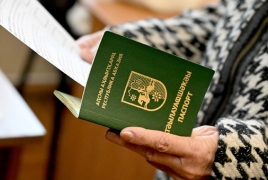
The self-proclaimed Republic of Abkhazia will hold a second round of presidential elections, according to Dmitry Marshan, head of the local Central Election Commission. Preliminary vote counts from the first round, held on February 15, show that no candidate surpassed the required 50% threshold for an outright victory.
The runoff is expected to take place in two weeks. Acting President Badra Gunba, who stepped down for the duration of the campaign, will face former Deputy Prime Minister and leader of the "Abkhaz People's Movement" Adgur Ardzinba.
According to Echo of the Caucasus, Gunba received around 46% of the vote in the first round, while Ardzinba secured 37%. Five candidates participated in the election.
Both candidates advocate close ties with Russia. The election follows the resignation of former President Aslan Bzhania in November amid protests against an investment agreement with Russia. The deal was later rejected in December, and in February, the sides agreed to review it. At the time, Gunba stated that Abkhazia aimed to attract Russian investment to boost its economy.
The Abkhazian election commission did not accredit Russian observers for the first round. Russian officials claimed they had submitted the necessary documents on time and expected a response by February 11, but none was received. The Abkhazian side cited disagreements over the number of observers but assured that all requests would be granted for the runoff.
Official Tbilisi condemned the elections, calling them illegitimate.
Most UN member states continue to recognize Abkhazia and South Ossetia as part of Georgia. These regions were autonomous entities within Soviet Georgia and declared independence in the early 1990s following the Soviet Union's collapse. After the 2008 war with Georgia, Russia recognized their independence and stationed troops there. Georgia officially considers both regions occupied by Russian forces.

